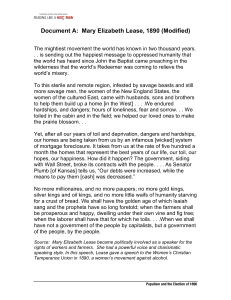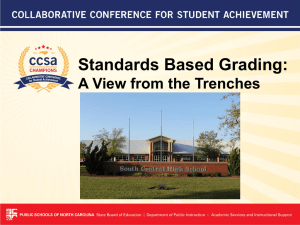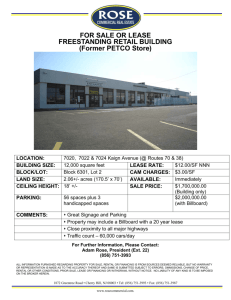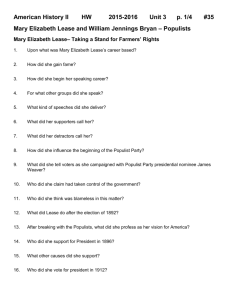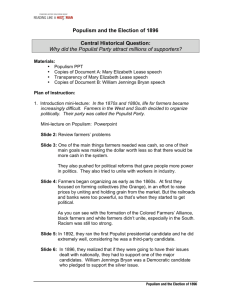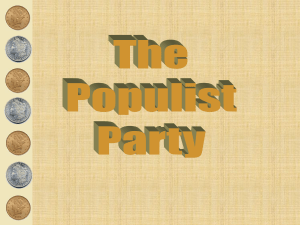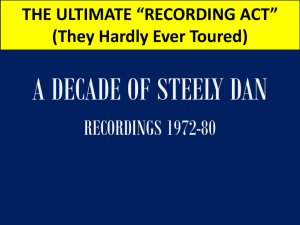File - Whitaker's Website
advertisement
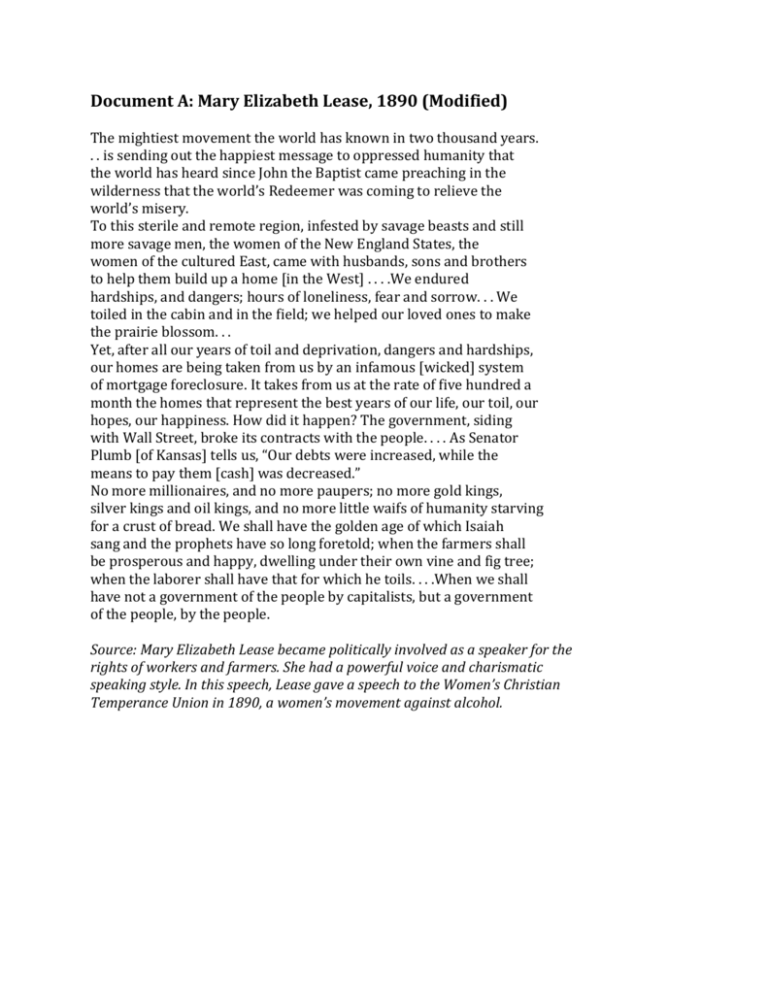
Document A: Mary Elizabeth Lease, 1890 (Modified) The mightiest movement the world has known in two thousand years. . . is sending out the happiest message to oppressed humanity that the world has heard since John the Baptist came preaching in the wilderness that the world’s Redeemer was coming to relieve the world’s misery. To this sterile and remote region, infested by savage beasts and still more savage men, the women of the New England States, the women of the cultured East, came with husbands, sons and brothers to help them build up a home [in the West] . . . .We endured hardships, and dangers; hours of loneliness, fear and sorrow. . . We toiled in the cabin and in the field; we helped our loved ones to make the prairie blossom. . . Yet, after all our years of toil and deprivation, dangers and hardships, our homes are being taken from us by an infamous [wicked] system of mortgage foreclosure. It takes from us at the rate of five hundred a month the homes that represent the best years of our life, our toil, our hopes, our happiness. How did it happen? The government, siding with Wall Street, broke its contracts with the people. . . . As Senator Plumb [of Kansas] tells us, “Our debts were increased, while the means to pay them [cash] was decreased.” No more millionaires, and no more paupers; no more gold kings, silver kings and oil kings, and no more little waifs of humanity starving for a crust of bread. We shall have the golden age of which Isaiah sang and the prophets have so long foretold; when the farmers shall be prosperous and happy, dwelling under their own vine and fig tree; when the laborer shall have that for which he toils. . . .When we shall have not a government of the people by capitalists, but a government of the people, by the people. Source: Mary Elizabeth Lease became politically involved as a speaker for the rights of workers and farmers. She had a powerful voice and charismatic speaking style. In this speech, Lease gave a speech to the Women’s Christian Temperance Union in 1890, a women’s movement against alcohol. Document B: William Jennings Bryan, 1896 (Modified) The merchant at the corner store is as much a businessman as the merchant of New York. The farmer who goes forth in the morning and toils all day...is as much a businessman as the man who [works on Wall Street]. We come to speak for this broader class of businessmen....It is for these that we speak. We are fighting in the defense of our homes and our families. We have petitioned, and our petitions have been scorned. We have entreated, and our entreaties have been disregarded. We have begged, and they have mocked us. We beg no longer; we entreat no more; we petition no more. We defy them! You come to us and tell us that the great cities are in favor of the gold standard. I tell you that the great cities rest upon these broad and fertile prairies. Burn down your cities and leave our farms, and your cities will spring up again as if by magic. But destroy our farms and the grass will grow in the streets of every city in this country. Having behind us the commercial interests and the laboring interests and all the toiling masses, we shall answer their demands for a gold standard by saying to them: you shall not press down upon the brow of labor this crown of thorns. You shall not crucify mankind upon a cross of gold. Source: The speech above was delivered by William Jennings Bryan at the Democratic National Convention in July 1896. It is considered one of the most famous speeches in American history. The passage is an excerpt. Guiding Questions Name___________ 1. Sourcing: Where is Bryan speaking? What is his purpose? 2. Context: Based on the speech, how do you think farmers and workers were feeling about business and industry? Find a quote to support your answer. 3. Close reading: What is the main point of his speech? 4. Close reading: What makes the speech so powerful? Pick the line that you think is most powerful and explain your choice. 5. Corroboration: What are two similarities between this speech and the speech by Mary Elizabeth Lease? Using both speeches, write a paragraph in response to the following question: Why were speakers like Lease and Bryan popular with farmers in the 1890s?
